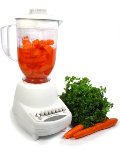To Drop Weight, JuicingŌĆÖs Great
Study: Participants Dropped Four Pounds with Vegetable Juice and Low-Calorie Diet
IŌĆÖm not much of a juicer.┬Ā And by ŌĆ£juicer,ŌĆØ IŌĆÖm not referring to the ŌĆ£juiceŌĆØ thatŌĆÖs become synonymous with steroids and human growth hormone (I think you probably already knew that, though).┬Ā IŌĆÖm talking the traditional juice, the kind that the juiceman himself, Jay Kordich, used to extol in his infomercials.
ItŌĆÖs not that I donŌĆÖt like vegetable juice.┬Ā Quite the contrary.┬Ā I drink vegetable juice, I just donŌĆÖt do drink it very often because I like to eat my vegetables more than I like to drink them.┬Ā I make time to eat them, in other words.
For many others, though, they donŌĆÖt have the time to eat the amount of vegetables recommended for their diet because theyŌĆÖre always on the go, go, go.┬Ā For these people, juicing is really the way to go.┬Ā And if youŌĆÖre looking to lose weight, again, juicing is really the way to go.┬Ā At least thatŌĆÖs what a new study from Baylor College of Medicine says (funded in part by the Campell Soup Company).
The study involved 81 adults with metabolic syndrome, which is an umbrella term used for people with a host of health ailments, like abdominal obesity, insulin resistance, hypertension and unhealthy cholesterol level discrepancies (e.g. high LDL cholesterol, low HDL cholesterol).
The participants were already on a low-calorie diet, but when researchers had half of them consume an eight-ounce glass of a low sodium vegetable juice every day for 12 weeks (presumably from V-8, considering theyŌĆÖre the ones that funded the study), half of the participants lost an average of four pounds.
Guess which half lost the weight?
Now, as you probably already know, IŌĆÖm not a huge fan of V-8 juice.┬Ā Sure, they produce a fine product and itŌĆÖs much better to drink a V-8 juice than it is to drink an empty calorie, nutrient-robbing can of soda, but their juices are very high in sodium.┬Ā A 12-ounce can of regular V-8 juice has about 1,000 milligrams of sodium ŌĆō about half of whatŌĆÖs recommended for a 2,000 calorie-a-day diet!
True, this study used V-8ŌĆÖs low sodium variety ŌĆō which has a much more reasonable 210 milligrams in a 12-ounce can ŌĆō but you can reduce your sodium content even further by doing it the old-fashioned way:┬Ā juicing from home with organic vegetables.
ItŌĆÖs no coincidence that this study involved a low sodium vegetable juice.┬Ā If it had involved their full sodium version, IŌĆÖm quite certain they wouldnŌĆÖt have seen such drops in weight.┬Ā And as I make clear in other articles and my book, The Blood Pressure Miracle, high sodium diets are tied to weight gain.
Imagine how much weight could have been lost among these 81 participants had they gone the traditional route?
The point is, get your vegetables into your system any way you can, either eaten or juiced straight from the vegetable source itself.┬Ā If the juice isnŌĆÖt salty enough for your taste, toss in a few pinches of organic sea salt.┬Ā It will increase the sodium level, but the sodium from this salt is a much healthier brand of salt than the table salts juicing companies use.
And you donŌĆÖt have to take that advice with a grain of salt; you can take it to the bank!
Sources:
nutraingredients-usa.com
v8juice.com
Related Posts
- Lose Weight by Eating More?
- Potassium-Enriched Salt Lowers Cardiovascular Disease Risk, Research Suggests
- Researchers Say Artificial Sweetener Saccharin Contributes to Weight Gain
- ŌĆśEggŌĆÖceptional Diet Option: Limited, Daily Egg Consumption Can Increase Weight Loss Results
- Redoubling Your Efforts: Researchers: For Weight Loss to Stay Lost, Obese Must Go the Extra Mile (Literally)
 
|
Enjoy this article? We guarantee your privacy. Your email address will NEVER be rented, traded or sold. |
Visit my new site: Self Help On The Web
 |
 |
Posted: April 30th, 2009 under Juicing, Weight Loss.
Tags: benefits of juicing, benefits of vegetable juice, health benefits of juicing, vegetable juice, vegetable juicer







